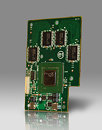
NVIDIA Releases PhysX System Software 9.09.0408 WHQL
NVIDIA made an update to the PhysX system software, the common backend for all NVIDIA products that support PhysX: GeForce 8 series and above graphics processors, and Ageia PhysX accelerator cards. Version 9.09.0408 packs the following changes and features according to the company:
DOWNLOAD: NVIDIA PhysX System Software 9.09.0408 WHQL
- Updated runtime to improved operation of Cryostasis Game.
- Supports NVIDIA PhysX acceleration on all GeForce 8-series, 9-series and 200-series GPUs with a minimum of 256MB dedicated graphics memory.
- Experience GPU PhysX acceleration in many games and demos, some of which are highlighted in PowerPack downloads on www.geforce.com.
- Runtime upgrade ONLY for AGEIA PhysX processors users. (New installations should install older PhysX system software such as version 8.09.04 - prior to installing this update).
- Includes the latest PhysX runtimes used in the latest game titles.
- Supports NVIDIA PhysX acceleration on GeForce via CUDA 2.0 for SDK versions 2.7.3, 2.7.2, 2.7.5, 2.8.0 and 2.8.1 (requires graphics driver v177.81 or later).
- Includes all the latest PhysX SDK Runtimes.
- Supports control of your GPU PhysX configuration from the NVIDIA display driver control panel. (requires graphics driver v180.00 or later)
DOWNLOAD: NVIDIA PhysX System Software 9.09.0408 WHQL



